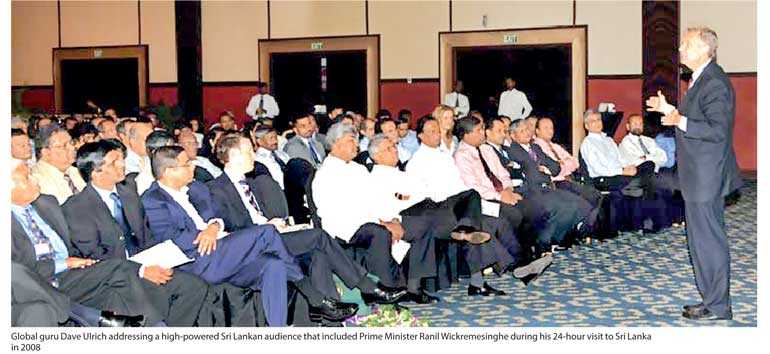Monday Feb 23, 2026
Monday Feb 23, 2026
Friday, 20 April 2018 00:01 - - {{hitsCtrl.values.hits}}

 Prof. Dave Ulrich is the Rensis Likert Professor at the Ross School of Business, University of Michigan. Ulrich has published over 25 books and has been ranked the #1 Management Educator and Guru by Business Week and named the most influential thinker of the decade in HR by HR magazine. Professor Ulrich in an interview with Dinesh Weerakkody talks of the many challenges faced by leaders and businesses and points out that CEOs can add
Prof. Dave Ulrich is the Rensis Likert Professor at the Ross School of Business, University of Michigan. Ulrich has published over 25 books and has been ranked the #1 Management Educator and Guru by Business Week and named the most influential thinker of the decade in HR by HR magazine. Professor Ulrich in an interview with Dinesh Weerakkody talks of the many challenges faced by leaders and businesses and points out that CEOs can add
considerably to their bottom line by being more attentive to “soft” organisation factors. Following are excerpts:
By Dinesh Weerakkody
Q: Your book ‘The Leadership Code’ provides a fascinating and helpful framework for leadership. However across those thousands of books and articles, among the countless legends and stories, you’ll find some common themes woven throughout successful leaders. What are they?
A: We have studied many of these works and tried to find common themes, which we put into our book Leadership Code. We recently updated this research and identified current leadership requirements. As much as 70% of leadership is transferable from one context to another (the other 30% is specific to that context or industry). The 70% is the code and contains five essentials: Strategist (focused on the organization for the future), Executor (focused on the organisation today), Talent manager (focused on individuals today), Human capital developer (focused on individuals for the future), Personal proficiency (the center of the model: person of character and integrity).
I think that the five Code domains remain the same, but some of the skills have pivoted beyond all this. We believe leaders can add to their bottom line by being more attentive to “soft” organization factors, such as the commitment level of employees, the quality of leaders, and the linkage of both to obtaining results. Such “intangible” factors account for 50% of a company’s market value.
Q: Which traits are we born with and which do we need to develop to
be successful?
A: The psychology research is pretty clear on this ¼ 50/50 overall ¼ half nature; half nurture. In our Code model, we think that the “personal proficiency” domain may be more 60/65 nature. We talk in that domain about the intellectual, emotional, physical, social, and spiritual attributes of leadership and some of these seem more innate than learned. The other four domains are probably50/50. Lately, I have used the term ‘predisposition’ which I like because it means that while a leader may be predisposed to not be a strategist, a person can clearly learn the skills to do so. I am predisposed to be an introvert, but I can learn the skills of being an extrovert when I do presentations and speak.
Q: Books all the time will talk about how a well-known business brand started at one time in someone’s basement or garage, so much that it’s become a sexy notion of sorts, going from rags-to-riches. What really identifies
a true entrepreneur?
A: An entrepreneur has a knack for seeing beyond the present, envisioning what might be, and turning those ideas and dreams into products and services. I think entrepreneurs can imagine a business or market opportunity that others may not have seen. They have a knack of seeing beyond what others experience to create a future experience. This discovery phase of innovation or entrepreneurship can be learned, to some extent, but it is also a god-given gift. Bezos at Amazon could envision online shopping beyond facilitating book sales; Jobs at Apple could envision iPhones and apps beyond computers.
Q: So far we have discussed some of the most important concepts you need to understand in order to achieve success in business – but how do you exactly justify what is true success? Is it money, or the influence your actions have over the environment and people around you?
A: Success in business or in life is a very personal decision and choice. For some it is monetary and therefore success to them is making boatloads of money. For others, it is power and success to them is having influence over people and events. For others it is relationships, and success is belong to a tribe and having deep friendship. For others, it is ideas and success is discovering new insights that shape thought and action that can change the world.
Success is so personal that there is not one definition that applies to all; and success may vary over a lifetime. Earlier in a career, success may be economic, but over time, this may shift to generativity and building next generation leaders. I think one of the most important coaching questions I ask is “what do I want” so that people can look at their strengths, values, predispositions and define success for them. If people don’t define success for them; someone else is likely to do so, not in the person’s interest.
Q: Technology over the last 10 years has altered the way we communicate and do things effectively. How has it impacted business and talent
management practices?
A: Technology allows information to shape behaviour. Through artificial intelligence, smart machines, robots, and other technology advances, most of the administrative heritage of HR will be automated. Many firms went to service centres (1-800-HR helpline) for administrative efficiency; now these service centres will likely be replaced with robots and/or self-service. HR work that is routine, standard, and repetitive can likely be automated. HR professionals will become more critical to offer judgment about talent, leadership, and organisation, but the administrative HR processes will not require human judgment. It talks about four stages of digital HR ¼ with most of the work done at stage 1 and stage 2.
Q: You are a strong advocate of good board governance. Are we heading in the right direction or are is it still talk and no real action?
A: Corporate governance is the system determining the direction and performance of companies. It consists of the interaction of the shareholders as owners, acting mainly at the annual general shareholders’ meetings, the board of directors, acting on behalf of the shareholders at board meetings, led by the chairman; and the executive management, in charge of operational management, led by the CEO. Board governance has primarily been financial and strategic oversight: is the management team delivering financial results and setting a strategy for future financial results?
Increasingly, I think this should be coupled with a focus on what I have called leadership capital. Leadership capital means that boards should look at the qualities of individual leaders at key positions in the firm and the capabilities of the organization around culture, talent, accountability, information, and work. I believe that these leadership capital intangibles will lead to long term, sustainable financial and strategic results.
Q: As the guru of gurus for HR, what are some of the new trends in HR?
A: I get very excited about how HR is not about HR, but about delivering business value. Employee experience is not just about employee sentiment, but how that sentiment will deliver business results. Without serving customers and investors, organisations do not exist, so employee experience should lead to better customer and investor experiences. My ‘Leadership Capital Index’ book highlights this connection. HR’s evolution will continue as current business issues place HR centre-stage (e.g., digital information age, #MeToo movement) and HR needs to continually upgrade to respond; but it is useful to move at this time from business partner 1.0 to business partner 2.0. We have identified 13 dimensions. Each of these 13 dimensions is the topic of a book that is on our website (www.rbl.net). The 13 trends capture the pivots to make business partner 2.0 happen.
Q: What is your experience of getting good CHROs to run businesses as CEOs?
A: In our research we found that top CHROs has a closer leadership profile to top CEOs than CMOs, CFOs and CIOs. The best CHROs think and act like CEOs in delivering business results.
Q: If HR could only do one big thing that would have the fastest impact, what would it be in your view?
A: Talent management continues to be a real challenge for all organisations. We have seen that many organisations have learned where and how to source talent. So I would say, how to source talent, bring talent on board, reward and motivate talent, and retain the best talent. That is what CEOs also want from HR.